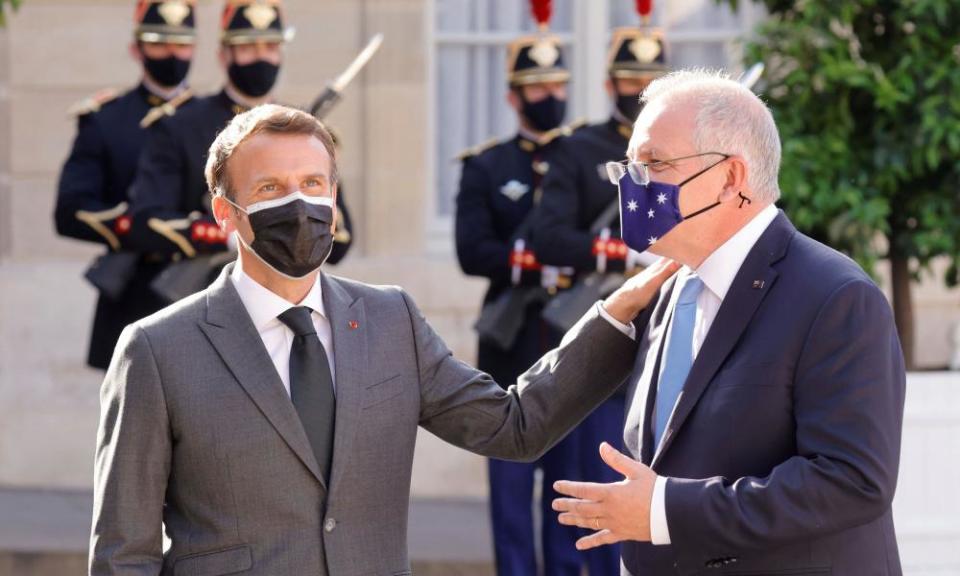Macron yet to take call from Australia’s Scott Morrison over sub snub

French president Emmanuel Macron has not yet taken a call from Scott Morrison amid continuing fury in Paris over the torn up submarine deal.
Morrison, the Australian prime minister, said he hoped to speak with Macron “when the time is right and when the opportunity presents” but he understood “the hurt and the disappointment” felt by France over the cancellation of the $90bn arrangement.
Macron and Joe Biden spoke by phone on Wednesday, nearly a week after the announcement of the defence partnership between Australia, the US and the UK prompted France to complain that it had been deliberately kept in the dark.
A joint statement issued by Macron and Biden after the call said that both leaders had “agreed that the situation would have benefited from open consultations among allies on matters of strategic interest to France and our European partners”.
Related: Aukus pact: France to send ambassador back to US after Macron-Biden call
In a sign of some progress, Macron promised the French ambassador to the United States would return to Washington next week. But it remains unclear when the French ambassador to Australia – who was also recalled to Paris late last week in protest at the decision – will return to his post.
Morrison said he was “glad” that Biden had been “able to reinforce, not just from the United States’ perspective, but from all partners in this new arrangement” the important role for France in the Indo-Pacific.
“I think that it’s been very important for the president to have that engagement,” Morrison told reporters in Washington on Thursday morning Australian time.
“I look forward, when the time is right and when the opportunity presents, that we will have a similar discussion.”
But Morrison suggested the issues between Australia and France would “take further time to work through than the ones that were being dealt with between the United States and France”.
Related: ‘Donnez-moi un break’: Johnson deepens rift with France over defence deal
Morrison said Australia valued its relationship with France, and wanted to work with it and Europe to preserve a stable and secure region.
“So our door is wide open. Our invitation is there. We understand the hurt and the disappointment. And we’ll be patient and we look forward to working with old friends again.”
Asked whether he would be willing to apologise to Macron when he spoke to him, Morrison stood by the decision and said he had acted in accordance with Australia’s national security interests.
“Hard decisions have to be made by prime ministers about our interests, and so of course that is something that was necessary for me to do.”
Morrison denied that Biden and Macron’s joint statement could be seen as a repudiation of Australia’s diplomacy in the lead-up to the deal’s cancellation.
Morrison said the US and France were Nato partners, a relationship that brought “certain expectations … about how they engage with each other on national security issues”.
“The issues that the US president was addressing are very different because it’s a different relationship, and has different obligations.”
Morrison maintained that Australia “had communicated” that it believed that a conventional submarine would no longer meet its requirements.
The French government has said it was “stabbed in the back” and “betrayed”, arguing the allies deliberately kept it in the dark and gave no genuine forewarning.
On Wednesday Morrison held talks with congressional leaders on Capitol Hill, including Speaker Nancy Pelosi, in a bid to shore up support for legislation that will be needed to allow the US to share its sensitive nuclear technology with Australia.
Welcoming Morrison to the Pentagon on Wednesday, US defense secretary Lloyd Austin emphasised that the Aukus partnership was “designed to build on our existing alliances”.
Austin said the alignment between the US and Australia was “stronger than ever”, as both countries saw the region’s challenges “through a similar lens” and shared “the same sense of urgency”. Both sides flagged plans for more US military deployments to Australia after annual security talks in Washington last week.
Morrison thanked the US for its support of Australian evacuation operations after the fall of Afghanistan to the Taliban in August, saying “there is no way Australia would have been able to airlift 4,100 people out of that terrible site were it not for the sacrifice of the US defence forces”.
At a separate media event, Morrison took aim at his political rivals in Australia, after Labor’s foreign affairs spokesperson, Penny Wong, sought assurances on the implications of the new arrangement for nuclear-propelled submarines, including that Australia will maintain the freedom to “act alone” amid increasing technological dependence on the US.
While not departing from her party’s qualified support for the announcement, Wong will use a speech on Thursday to renew calls for the Coalition to set up a bipartisan process that includes Labor so the success of the multi-decade acquisition is not “at the mercy of changing political winds”.
“I think that Australians would be puzzled as to why there can be bipartisan support for this initiative in the United States and within days, within days, the Labor party seems to be having an each way bet,” Morrison said.
“I don’t have each way bets on national security.”
Morrison said the three conditions for support set out by Anthony Albanese would all be met. Labor has sought commitments that Australia will not set up a domestic civil nuclear industry, nor to acquire nuclear weapons, and that it will comply with the non-proliferation treaty.
Morrison said it was important for the initiative to have bipartisan support and “these matters will be worked through in the normal way”.

 Yahoo Finance
Yahoo Finance 